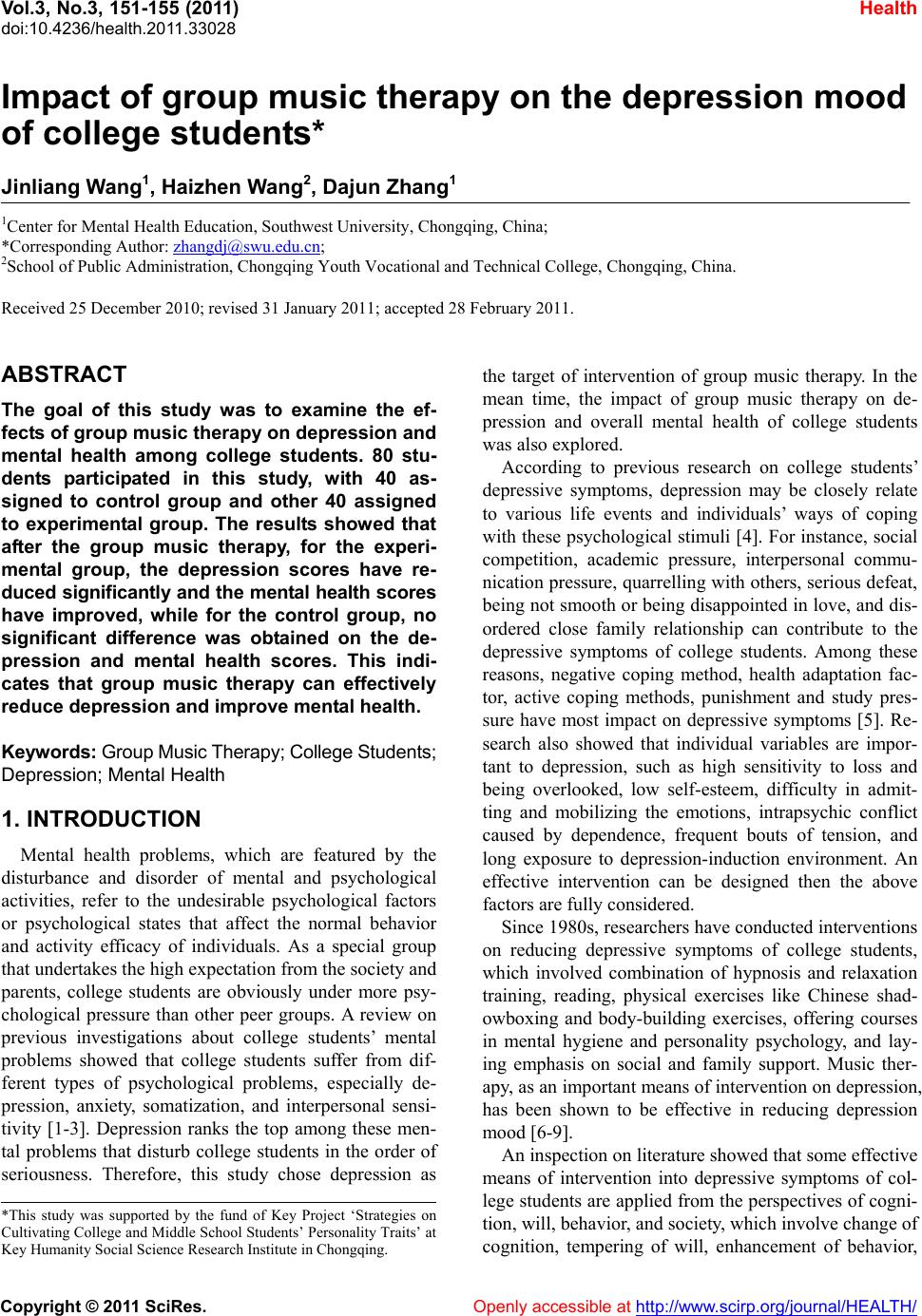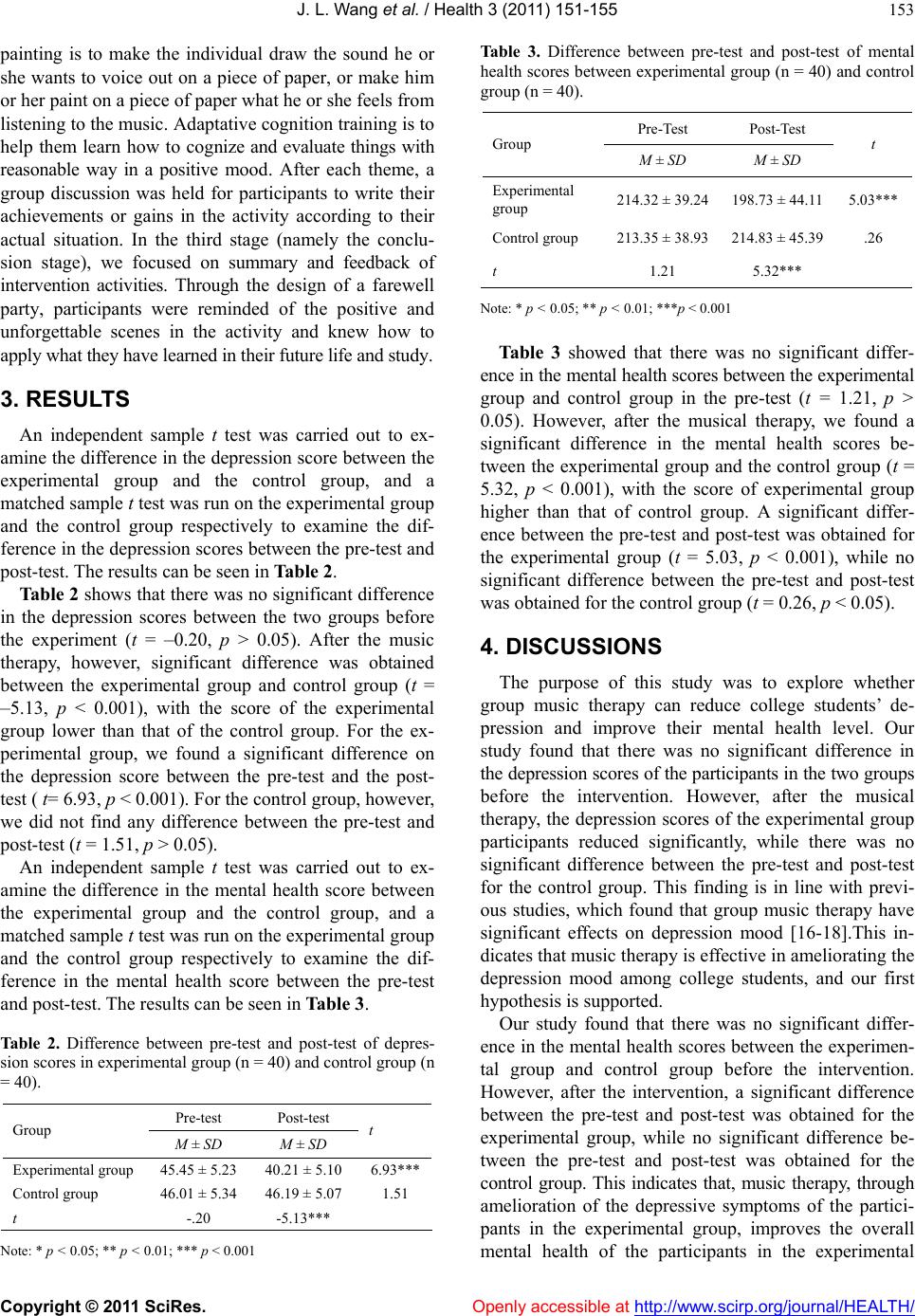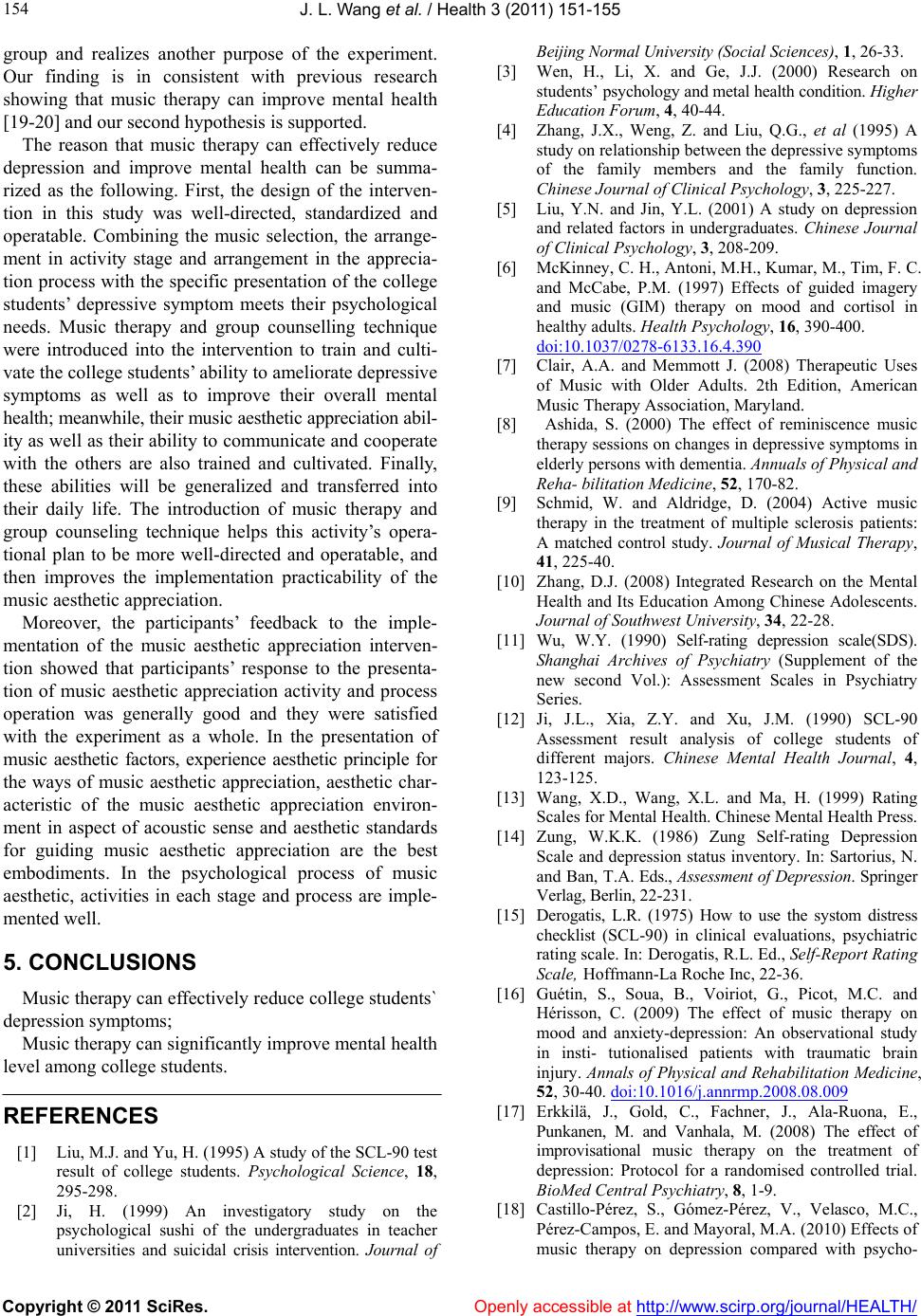Paper Menu >>
Journal Menu >>
 Vol.3, No.3, 151-155 (2011) Health doi:10.4236/health.2011.33028 Copyright © 2011 SciRes. Openly accessible at http://www.scirp.org/journal/HEALTH/ Impact of group music therapy on the depression mood of college students* Jinliang Wang1, Haizhen Wang2, Dajun Zhang1 1Center for Mental Health Education, Southwest University, Chongqing, China; *Corresponding Author: zhangdj@swu.edu.cn; 2School of Public Administration, Chongqing Youth Vocational and Technical College, Chongqing, China. Received 25 December 2010; revised 31 January 2011; accepted 28 February 2011. ABSTRACT The goal of this study was to examine the ef- fects of group music therapy on depression and mental health among college students. 80 stu- dents participated in this study, with 40 as- signed to control group and other 40 assigned to experimental group. The results showed that after the group music therapy, for the experi- mental group, the depression scores have re- duced significantly and the mental health scores have improved, while for the control group, no significant difference was obtained on the de- pression and mental health scores. This indi- cates that group music therapy can effectively reduce depression and improve ment al health. Keywords: Group Music Therapy; College Students; Depression; Ment al Health 1. INTRODUCTION Mental health problems, which are featured by the disturbance and disorder of mental and psychological activities, refer to the undesirable psychological factors or psychological states that affect the normal behavior and activity efficacy of individuals. As a special group that undertakes the high expectation from the society and parents, college students are obviously under more psy- chological pressure than other peer groups. A review on previous investigations about college students’ mental problems showed that college students suffer from dif- ferent types of psychological problems, especially de- pression, anxiety, somatization, and interpersonal sensi- tivity [1-3]. Depression ranks the top among these men- tal problems that disturb college students in the order of seriousness. Therefore, this study chose depression as the target of intervention of group music therapy. In the mean time, the impact of group music therapy on de- pression and overall mental health of college students was also explored. According to previous research on college students’ depressive symptoms, depression may be closely relate to various life events and individuals’ ways of coping with these psychological stimuli [4]. For instance, social competition, academic pressure, interpersonal commu- nication pressure, qu arrelling with others, serious d efeat, being not smooth or being disappointed in love, and dis- ordered close family relationship can contribute to the depressive symptoms of college students. Among these reasons, negative coping method, health adaptation fac- tor, active coping methods, punishment and study pres- sure have most impact on depressive symptoms [5]. Re- search also showed that individual variables are impor- tant to depression, such as high sensitivity to loss and being overlooked, low self-esteem, difficulty in admit- ting and mobilizing the emotions, intrapsychic conflict caused by dependence, frequent bouts of tension, and long exposure to depression-induction environment. An effective intervention can be designed then the above factors are fully considered. Since 1980s, researchers have conducted intervention s on reducing depressive symptoms of college students, which involved combination of hypnosis and relaxation training, reading, physical exercises like Chinese shad- owboxing and body-building exercises, offering courses in mental hygiene and personality psychology, and lay- ing emphasis on social and family support. Music ther- apy, as an impor tant means of interv ention on d epression, has been shown to be effective in reducing depression mood [6-9]. An inspection on literature sho w ed th at so me effective means of intervention into depressive symptoms of col- lege students are app lied from the perspectives of cogni- tion, will, behavior, and society, which involve change of cognition, tempering of will, enhancement of behavior, *This study was supported by the fund of Key Project ‘Strategies on Cultivating College and Middle School Students’ Personality Traits’ at Key Humanity Social Science Research Institute in Chongqing.  J. L. Wang et al. / Health 3 (2011) 151-155 Copyright © 2011 SciRes. Openly accessible at http://www.scirp.org/journal/HEALTH/ 152 and adaptation to society. Zhang points out that current mental health education inclines to “highlighting behav- ior training while overlooking the internalization of ex- periences” during specific practice. Therefore, the im- portant role of internalization of emotion and experi- ences shall be emphasized properly [10]. According to the analysis on the literature, depressive symptoms are a type of sad emotion experienced by the individual, with subjective negative emotional experience as its core element. Therefore, the key to reducing depressive symp- toms is to transfer the negative emotional experience into positive emotional one. In the above studies of ef- fective methods to affect depressive symptoms of col- lege students, we find little of study on effective inter- vention from the perspective of emotional experience. Hence, this study tries to use music therapy as the inter- vention to decrease the depressive symptoms of college students. It is an exploratory study on the mental health education of college students. In the current study, two hypotheses were proposed. Hypothesis 1. Music therapy may effectively affect the depressive symptoms of college students. Hypothesis 2. Music therapy may promote the overall mental health of college students by alleviating the de- pressive symptoms. 2. METHOD 2.1. Participants Tests of depressive symptoms and overall mental health have been conducted for th e participants selection. According to the study of Wu [11] and Ji, et al [12], the college students with the score of SDS self-rating de- pression scale, greater than 40 and score of depression factors of SCL-90, the symptom checklist, greater than 2.18 are selected as the participants. In this study, 80 students (Control group = 40, Experimental group = 40) were selected as the participants (Mean age = 19.35; SD = 1.68). 2.2. Experimental Design The balance group pre-test and post-test experimental design is used, with the music therapy as the independ- ent variable and the depression score and mental health score as the dependent variable (See Table 1). 2.3. Measurement The self-rating depressive scale (SDS) The Chinese version of the SDS is a self-report measure of depression consisting of 20 items, with a four-point scale ranging from a little of the time (1) to most of the time (4). Of the 20 items, 10 are worded positively and 10 are worded Tabl e 1. Experimental design of music therapy intervention on depression. Group Pre-Test Intervention Post-Test Depression score Depression score Experimental group Mental health score Music therapy Mental health score Depression score Depression score Control groupMental health score No therapy Mental health score negatively. The former 10 items are reversed items [13]. The validity and the reliability of the SDS have been reported (for review, see Zung, 1986) [14]. The symptom checklist 90 (SCL-90) The Chinese version of the SCL-90 was used to measure mental health level o f the p artic ipan ts. Th e 90 -ite m s cale in c lud es 10 factors including somatization, obsessivecompulsive symptoms, interpersonal sensitivity, depression, anxiety, hostility, pho bia anxiety, parano ia ideation, psychoticism, et al. The validity and the reliability of the SCL-90 have been reported (Derogatis, 1984 ) [15]. 2.4. Intervention The entire intervention was divided into 3 stages in- cluding the introdu ction stage, the implementation stag e, and the feedback stage, with each stage having their own themes. Specifically, the introduction stage has one theme: cultivating and training interpersonal skills. Students suffering from depression tend to withdraw from group activities because they feel inferior, lack experiences or have no common interests and often do not know how to build relationship with others. Music therapy activity, however, can help them interact with one another and provide them with the opportunity and motivation for participating group activity. In th e stage two (namely the implementation stage), five themes are included, which are relaxation training, attention training, rhythm and movement training, music-painting training, and adapta- tive cognition training. We have good reasons to select these themes as our intervention focuses. For example, for participants who suffer from anorexia, insomnia, ten- sion, fidget and mood swings, it is difficult to calm them down to appreciate music, so relaxation training is con- ducted, i.e. training on how to loose all muscles or to take deep breathing to alleviate their tension or fidget and then they are guided to appreciate music. Attention train- ing is to mobilize potentials of the participants fully and for bringing their other healthy psychological factors into normal function. Rhythm and movement training is to help participants rebuild their adaptive behavior. Music-  J. L. Wang et al. / Health 3 (2011) 151-155 Copyright © 2011 SciRes. Openly accessible at http://www.scirp.org/journal/HEALTH/ 153 painting is to make the individual draw the sound he or she wants to voice out on a piece of paper, or make him or her paint on a piece of paper what he or she feels from listening to the music. Adaptativ e cognition train ing is to help them lear n how to cognize and evaluate things with reasonable way in a positive mood. After each theme, a group discussion was held for participants to write their achievements or gains in the activity according to their actual situation. In the third stage (namely the conclu- sion stage), we focused on summary and feedback of intervention activities. Through the design of a farewell party, participants were reminded of the positive and unforgettable scenes in the activity and knew how to apply what they have learned in thei r future life and study . 3. RESULTS An independent sample t test was carried out to ex- amine the difference in the depression score between the experimental group and the control group, and a matched sample t test was run on the experimental grou p and the control group respectively to examine the dif- ference in the depression scores between the pre-test and post-test. The results can be seen in Table 2. Table 2 shows that there was no significant difference in the depression scores between the two groups before the experiment (t = –0.20, p > 0.05). After the music therapy, however, significant difference was obtained between the experimental group and control group (t = –5.13, p < 0.001), with the score of the experimental group lower than that of the control group. For the ex- perimental group, we found a significant difference on the depression score between the pre-test and the post- test ( t= 6.93, p < 0.001). For the control group, how ev e r, we did not find any difference between the pre-test and post-test (t = 1.51, p > 0.05). An independent sample t test was carried out to ex- amine the difference in the mental health score between the experimental group and the control group, and a matched sample t test was run on the experimental grou p and the control group respectively to examine the dif- ference in the mental health score between the pre-test and post-test. The results can be seen in Table 3. Table 2. Difference between pre-test and post-test of depres- sion scores in experimental group (n = 40) and control group (n = 40). Pre-test Post-test Group M ± SD M ± SD t Experimental group 45.45 ± 5.2340.21 ± 5.10 6.93*** Control group 46.01 ± 5.3446.19 ± 5.07 1.51 t -.20 -5.13*** Note: * p < 0.05; ** p < 0.01; *** p < 0.001 Table 3. Difference between pre-test and post-test of mental health scores between experimental group (n = 40) and control group (n = 40). Pre-Test Post-Test Group M ± SD M ± SD t Experimental group 214.32 ± 39.24 198.73 ± 44.11 5.03*** Control group 213.35 ± 38.93 214.83 ± 45.39 .26 t 1.21 5.32*** Note: * p < 0.05; ** p < 0.01; ***p < 0.001 Table 3 showed that there was no significant differ- ence in the mental health scores between the experimental group and control group in the pre-test (t = 1.21, p > 0.05). However, after the musical therapy, we found a significant difference in the mental health scores be- tween the experimental group and the control group (t = 5.32, p < 0.001), with the score of experimental group higher than that of control group. A significant differ- ence between the pre-test and post-test was obtained for the experimental group (t = 5.03, p < 0.001), while no significant difference between the pre-test and post-test was obtained for the control group (t = 0.26, p < 0.05). 4. DISCUSSIONS The purpose of this study was to explore whether group music therapy can reduce college students’ de- pression and improve their mental health level. Our study found that there was no significant difference in the depression scores of the participants in the two groups before the intervention. However, after the musical therapy, the depression scores of the experimental group participants reduced significantly, while there was no significant difference between the pre-test and post-test for the control group. This finding is in line with previ- ous studies, which found that group music therapy have significant effects on depression mood [16-18].This in- dicates that music therapy is effective in ameliorating the depression mood among college students, and our first hypothesis is suppo rted. Our study found that there was no significant differ- ence in the mental health scores between the experimen- tal group and control group before the intervention. However, after the intervention, a significant difference between the pre-test and post-test was obtained for the experimental group, while no significant difference be- tween the pre-test and post-test was obtained for the control group. This indicates that, music therapy, through amelioration of the depressive symptoms of the partici- pants in the experimental group, improves the overall mental health of the participants in the experimental  J. L. Wang et al. / Health 3 (2011) 151-155 Copyright © 2011 SciRes. Openly accessible at http://www.scirp.org/journal/HEALTH/ 154 group and realizes another purpose of the experiment. Our finding is in consistent with previous research showing that music therapy can improve mental health [19-20] and our second hypothesis is supported. The reason that music therapy can effectively reduce depression and improve mental health can be summa- rized as the following. First, the design of the interven- tion in this study was well-directed, standardized and operatable. Combining the music selection, the arrange- ment in activity stage and arrangement in the apprecia- tion process with the specific pr esentation of the college students’ depressive symptom meets their psychological needs. Music therapy and group counselling technique were introduced into the intervention to train and culti- vate the college stud ents’ ab ility to a meliorate depressive symptoms as well as to improve their overall mental health; meanwhile, their music aesthe tic appreciation abil- ity as well as their ability to co mmunicate and cooperate with the others are also trained and cultivated. Finally, these abilities will be generalized and transferred into their daily life. The introduction of music therapy and group counseling technique helps this activity’s opera- tional plan to be more well-directed and operatable, and then improves the implementation practicability of the music aesthetic appreciation. Moreover, the participants’ feedback to the imple- mentation of the music aesthetic appreciation interven- tion showed that participants’ response to the presenta- tion of music aesthetic appreciation activity and process operation was generally good and they were satisfied with the experiment as a whole. In the presentation of music aesthetic factors, experience aesthetic principle for the ways of music aesthetic appreciation, aesthetic char- acteristic of the music aesthetic appreciation environ- ment in aspect of acoustic sense and aesthetic standards for guiding music aesthetic appreciation are the best embodiments. In the psychological process of music aesthetic, activities in each stage and process are imple- mented well. 5. CONCLUSIONS Music therapy can effectively reduce college students` depression symptoms; Music therapy can significantly improve mental health level among college students. REFERENCES [1] Liu, M.J. and Yu, H. (1995) A study of the SCL-90 test result of college students. Psychological Science, 18, 295-298. [2] Ji, H. (1999) An investigatory study on the psychological sushi of the undergraduates in teacher universities and suicidal crisis intervention. Journal of Beijing Normal University (Social Sciences), 1, 26-33. [3] Wen, H., Li, X. and Ge, J.J. (2000) Research on stu d ents’ psychology and metal health condition. Higher Education Forum, 4, 40-44. [4] Zhang, J.X., Weng, Z. and Liu, Q.G., et al (1995) A study on relationship between the depressive symptoms of the family members and the family function. Chinese Journal of Clinical Psychology, 3, 225-227. [5] Liu, Y.N. and Jin, Y.L. (2001) A study on depression and related factors in undergraduates. Chinese Journal of Clinical Psychology, 3, 208-209. [6] McKinney, C. H., Antoni, M.H., Kumar, M., Tim, F. C. and McCabe, P.M. (1997) Effects of guided imagery and music (GIM) therapy on mood and cortisol in healthy adults. Health Psychology, 16, 390-400. doi:10.1037/0278-6133.16.4.390 [7] Clair, A.A. and Memmott J. (2008) Therapeutic Uses of Music with Older Adults. 2th Edition, American Music Therapy Association, Maryland. [8] Ashida, S. (2000) The effect of reminiscence music therapy sessions on changes in depressive symptoms in elderly persons with dementia. Annuals of Physical and Reha- bilitation Medicine, 52, 170-82. [9] Schmid, W. and Aldridge, D. (2004) Active music therapy in the treatment of multiple sclerosis patients: A matched control study. Journal of Musical Therapy, 41, 225-40. [10] Zhang, D.J. (2008) Integrated Research on the Mental Health and Its Education Among Chinese Adolescents. Journal of Southwest University, 34, 22-28. [11] Wu, W.Y. (1990) Self-rating depression scale(SDS). Shanghai Archives of Psychiatry (Supplement of the new second Vol.): Assessment Scales in Psychiatry Series. [12] Ji, J.L., Xia, Z.Y. and Xu, J.M. (1990) SCL-90 Assessment result analysis of college students of different majors. Chinese Mental Health Journal, 4, 123-125. [13] Wang, X.D., Wang, X.L. and Ma, H. (1999) Rating Scales for Mental Health. Chinese Mental Health Press. [14] Zung, W.K.K. (1986) Zung Self-rating Depression Scale and depression status inventory. In: Sartorius, N. and Ban, T.A. Eds., Assessment of Depre ssion. Springer Ver lag , B e r l in , 22-231. [15] Derogatis, L.R. (1975) How to use the systom distress checklist (SCL-90) in clinical evaluations, psychiatric rating scale. In: Derogatis, R.L. Ed., Self-Report Rating Scale, Hoffmann-La Roche Inc, 22-36. [16] Guétin, S., Soua, B., Voiriot, G., Picot, M.C. and Hérisson, C. (2009) The effect of music therapy on mood and anxiety-depression: An observational study in insti- tutionalised patients with traumatic brain injury. Annals of Physical and Rehabilitation Medicine, 52, 30-40. doi:10.1016/j.annrmp.2008.08.009 [17] Erkkilä, J., Gold, C., Fachner, J., Ala-Ruona, E., Punkanen, M. and Vanhala, M. (2008) The effect of improvisational music therapy on the treatment of depression: Protocol for a randomised controlled trial. BioMed Central Psychiatry, 8, 1-9. [18] Castillo-Pérez, S., Gómez-Pérez, V., Velasco, M.C., Pérez-Campos, E. and Mayoral, M.A. (2010) Effects of music therapy on depression compared with psycho-  J. L. Wang et al. / Health 3 (2011) 151-155 Copyright © 2011 SciRes. Openly accessible at http://www.scirp.org/journal/HEALTH/ 155 therapy. Arts in Psychotherapy, 37, 387-390. doi:10.1016/j.aip.2010.07.001 [19] Chang, M.Y., Chen, C.H. and Huang, K.F. (2008) Effects of music therapy on psychological health of women during pregnancy. Journal of Clinical Nursing, 17, 2580-2587. doi:10.1111/j.1365-2702.2007.02064.x [20] Choi, A.N., Lee, M.S. and Hyun, H.J. (2008) Effects of group music intervention on depression, anxiety, and relation- ships in psychiatric patients: A pilot study. Journal of Alternative & Complementary Medicine, 14, 567-570. doi:10.1089/acm.2008.0006 |

